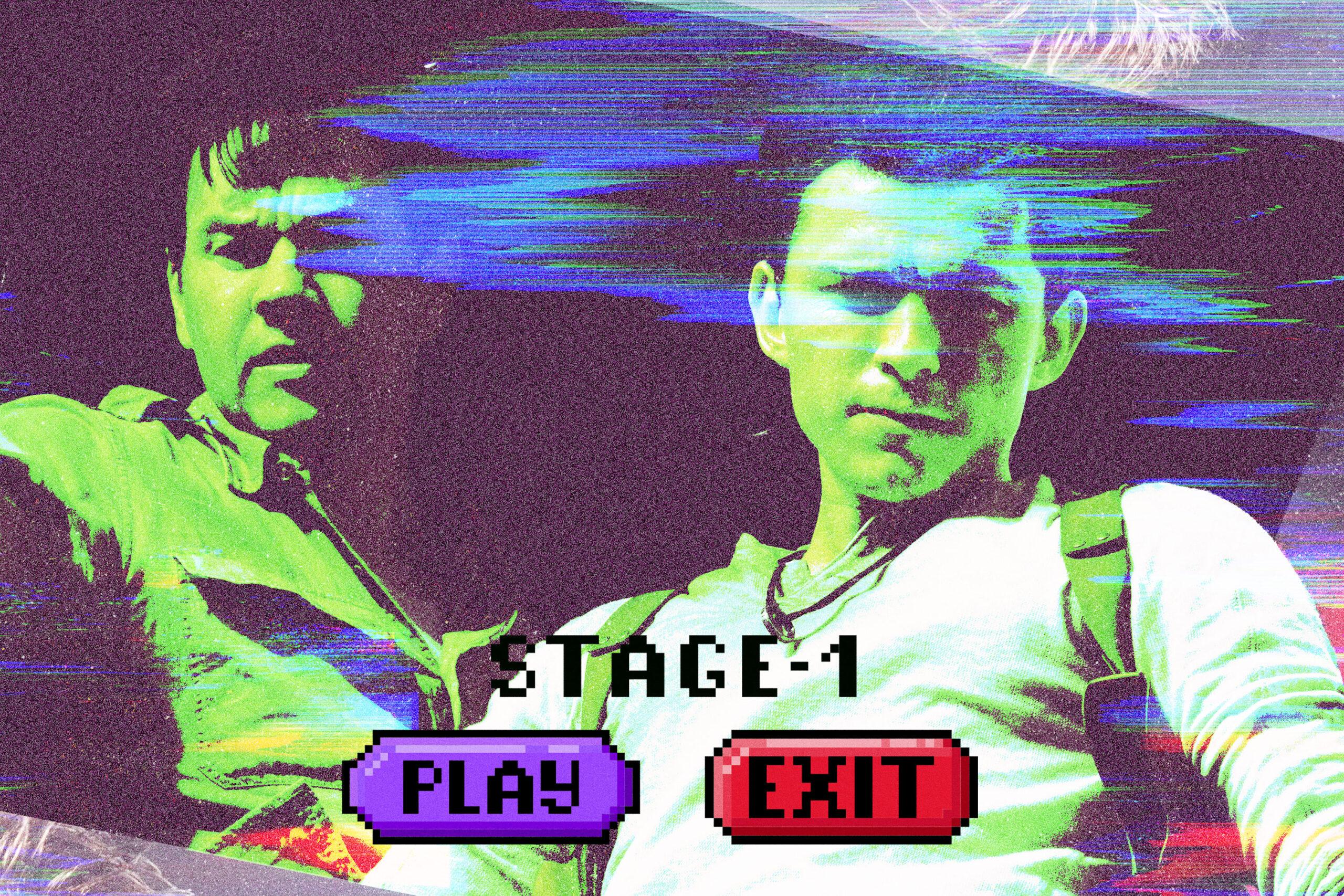
Sony Pictures’ Uncharted wastes little time putting Nathan Drake (played by Tom Holland) in the thick of the action, opening with the treasure hunter dangling from a crate that is already dangling from a cargo plane. (All that’s missing is Drake doing the record-scratch, freeze-frame meme.) Time and gravity aren’t on Drake’s side—he has to climb the unstable crates and make his way back onto the plane, all while avoiding the nameless henchmen risking their own (apparently meaningless?) lives to stop him. As far as kicking off an aspiring action-adventure franchise goes, Uncharted hits a sweet spot: Audiences unfamiliar with the video game series of the same name should be able to get invested in a film in which Peter Parker is one false step from falling tens of thousands of feet to his doom, while fans will appreciate that one of the games’ most breathtaking sequences has been brought to life on the big screen.
Among the ever-growing canon of video game adaptations, which will include a Sonic the Hedgehog sequel, a Halo TV show, an HBO series based on The Last of Us, and a BioShock movie at Netflix, Uncharted seemed to be the ideal franchise to receive the blockbuster treatment because it already felt like one by design. The thrill of Uncharted was how, from the quippy cutscenes to the narrative-driven gameplay, everything about the games felt cinematic—the sensation that the player was an active participant in their own adrenaline-pumping movie. Instead of watching Indiana Jones, you are Indiana Jones.
The blockbuster vibes of Uncharted weren’t lost on gamers: Nathan Fillion was long considered the dream casting for Drake, and the actor responded by campaigning for the role on Twitter and even appearing in a fan-made short film opposite Stephen Lang, who played the character’s mustachioed mentor Victor “Sully” Sullivan. But as studios kicked the tires on an Uncharted film adaptation for years, the lead role ultimately fell into the lap of Holland, a rising star half as old as Fillion. (Sully, meanwhile, would be played by Mark Wahlberg, who was once in line to play Drake and is now … as old as Fillion.) That the movie spent more than a decade in development hell, during which Uncharted launched über-popular sequels on the way to becoming one of the most celebrated video game franchises of all time, fueled hype for the adaptation even further.
But the strange thing about turning Uncharted into a successful tentpole is that the blueprint already has been established: The Indiana Jones franchise is proof of concept that a treasure hunter—er, “archeologist”—makes for a riveting action hero. While other video game adaptations have to learn how to translate their material into a new medium—and history hasn’t been kind to them—Uncharted could follow the map that other action-adventure movies have, well, charted. (See also: National Treasure, The Adventures of Tintin, the Brendan Fraser–led Mummy trilogy.) But the well-worn path of the subgenre is also a double-edged sword: Now that Uncharted has become a blockbuster of its own, what actually makes it distinct from the action-adventure franchises that came before it?
Once Uncharted establishes that Shit Will Go Down on a cargo plane, the film hits pause on the action to flesh out Drake’s backstory. A self-described descendant of the British explorer Sir Francis Drake, Drake grew up in an orphanage with his older brother Sam (Outer Banks’ Rudy Pankow), who later ran away to avoid getting arrested for breaking into a museum. Years later, Drake is recruited by Sully, who worked with Sam before he was (supposedly) killed, to hunt down a billion dollars worth of gold hidden by the Magellan expedition. In the race for Magellan’s lost treasure, Drake and Sully have to deal with the villainous Santiago Moncada (Antonio Banderas), himself a descendant of one of the expedition’s explorers, as well as fellow treasure hunter Chloe Frazer (Sophia Ali), who only looks out for herself among thieves.
It’s a familiar setup for fans of the games and moviegoers with a love for the subgenre alike. But without the interactivity of the games, in which the player assumes the role of the protagonist, the burden of crafting a worthwhile story is that much heavier. One of the biggest obstacles for the film wasn’t anything the characters had to literally scale—it was finding an actor equipped to play Drake. It’s why fans latched on to Fillion in the first place: Aside from sharing a first name with and a general likeness to Nathan Drake, the actor’s years of experience playing wisecracking heroes in the likes of Firefly and Castle made him a worthy fit. In Holland, Uncharted is certainly riding the hot hand, coming to theaters months after the actor headlined one of the highest-grossing movies of all time. But the boyish charm that makes Holland the ideal Peter Parker makes him ill-suited to play Nathan Drake. At the start of the film, Drake is working as a bartender at a fancy Manhattan bar, but with Holland in the role, it’s impossible not to think he’s an underage barback making Negronis when his boss isn’t looking. Moreover, while Peter Parker and Drake are both charming, they’re charming in very different ways. Peter is an adorably hapless teen; Drake is more of an undeniable rogue—yet another reason that Uncharted is often endearingly described as “Indiana Jones the video game.”
Indeed, the shadow of Indiana Jones looms large over Uncharted, which embraces such comparisons by directly referencing the movies in dialogue and paying homage to its map sequences. Viewed in a certain light, director Ruben Fleischer is tipping his cap to the inspiration behind the games, just as Indiana Jones was once cribbing from old Republic Pictures serials that have since faded from history. But in the head-spinning process of [deep breath] turning a game that feels like a movie into a movie based on a game that’s inspired by movies, Uncharted’s resemblance to other action-adventure franchises becomes a hindrance. Strip away the novelty of navigating your own adventure from a generation-defining video game quadrilogy, and the characteristics that Uncharted shares with these kinds of movies are the very ingredients for a bland ripoff. Sure enough, the occasionally thrilling setpiece—the cargo plane tussle does slap—is overshadowed by twists, MacGuffins, and puzzle-solving that’s been done countless times before in better movies. (It’s also telling that the most memorable moment of the film is plucked right from the games.)
Despite more adaptations being green-lit than ever before, Hollywood has continued to struggle when it comes to cracking the video game code. (To be fair, some strides have been made on television.) But that doesn’t mean that there aren’t important lessons to take from Uncharted’s underwhelming translation to the big screen. With iconic Hollywood influences baked into its globe-trotting premise, Uncharted appeared destined to be the One Video Game Adaptation to Rule Them All. But now that another great franchise has failed to live up to the hype, there’s even more evidence that what makes a movie succeed and what makes a video game succeed may be mutually exclusive—no matter how much DNA they seem to share.

